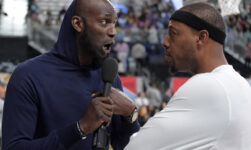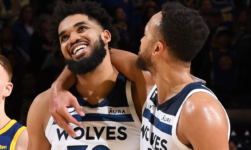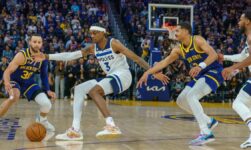Sports are full of what-ifs. They’re what make every game, every quarter, every moment so entertaining as the grasp of a championship trophy inches closer and closer. Just the other day, the newest Cleveland Cavalier, Donavan Mitchell, was explaining on The Woj Pod how an eight-second violation he committed in the first game of the first round of the 2020 playoffs in the bubble might have precipitated the breakup and impending rebuild of the entire Utah Jazz franchise.
“Not to say we go ahead and win a championship … but that, for me, was huge when we lost,” Mitchell said. “If I don’t take my sweet time walking the ball up the floor and we win that game, what does that look like? What does the next season look like? What does the next season look like? There’s always those ifs, ands, and buts you can play.”
Yes, especially in players’ minds, every moment matters.
One that’s gotten a bit more attention in NBA circles, and that’s been nightmarishly replayed in the heads of Golden State Warriors fans for years, is when Draymond Green committed a flagrant foul on LeBron James in Game 4 of the 2016 NBA Finals. Green and James got tangled up at half-court and James tried to step over Green to get back into the play, while Green’s arm flew up into James’ groin area.
No foul was called on the play, but the league retroactively issued a flagrant foul for Green, along with a technical for James. The violation resulted in Green’s fourth flagrant foul point of the postseason, which triggered an automatic suspension for Game 5.
Golden State was coming off the best regular season in NBA history and appeared to be well on its way to a second-straight title, but Cleveland was able to win Game 5 in Green’s absence — the first of three straight wins for the Cavaliers, who famously came back from a 3-1 deficit to win the franchise’s first NBA championship.
Green revisited the play recently on the “Checc’n In” podcast (h/t NBC Sports Bay Area) and took full responsibility for his actions. He even went as far as to agree with many basketball fans around the globe in saying that had he not been suspended, the Warriors would have won the title that season. Somewhat surprisingly, however, Green also said that if he had to do it over again, he wouldn’t change his reaction.
“I take that on the chin. I cost us a championship. I’m fine with that. I can take that on the chin. No problem. I own up to my mistakes,” Green said. “Would I do it again? One thousand percent. If somebody try to step over me, I’m going to hit them.”
Green then explained why his regrets stem from incidents in previous games rather than the altercation with James.
“What I wouldn’t do again is, I wouldn’t allow myself to be in the position to where someone can make that decision and cost me,” Green said. “And so guess what? If I get to that point again and you step over me, I’m going to try to hit you again. But I wouldn’t be in the same position with flagrant amount of points, with the amount of techs to where I leave that decision in someone else’s hands.”
Please check the opt-in box to acknowledge that you would like to subscribe.
Thanks for signing up!
Keep an eye on your inbox.
Sorry!
There was an error processing your subscription.
Throughout his career, Green has walked the fine line with his intensity — trying to push things as far as he can with opponents, officials and sometimes teammates, without losing control. Warriors coach Steve Kerr has talked about the importance of that balance, and how Green often knows when to back off when he’s in danger of costing his team valuable points or, even worse, being suspended.
Even with six years of reflection, Green clearly still feels that James trying to step over him was disrespectful, and warranted the retribution he delivered.
It’s easy for Green to say he shouldn’t have been in that position in the first place, but the only way to ensure that he won’t be in those situations is to change the very fiber of his being, and we all know that’s not going to happen. After all, it’s gotten him four championships and a likely Hall of Fame resumé. So as long as Green’s on the court, the Warriors — or whichever team he ends up playing for down the road — are going to have to live with the occasional suspension, and hope that the positives continue to outweigh the negatives.
If we’re talking about what-ifs, however, the Warriors likely don’t sign Kevin Durant the summer after the 2016 Finals if they win the title, and perhaps they don’t win championships in 2017 and 2018 without him. So some could say that Green’s suspension ultimately benefited the Warriors franchise. That’s why it’s usually a bad idea to play the what-if game — if we get bogged down in the butterfly effects, we’ll drive ourselves to the point of insanity.






